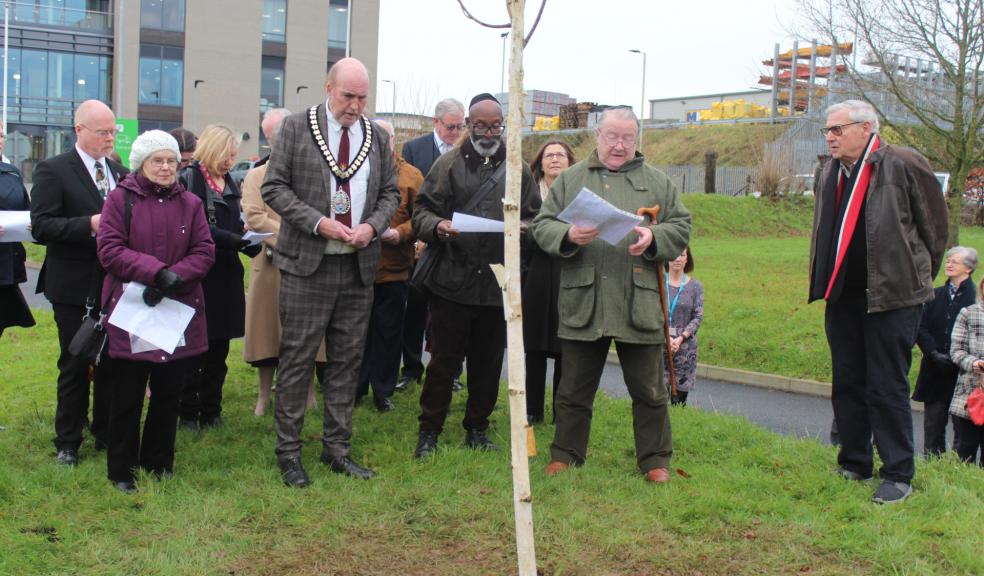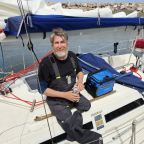
Holocaust Memorial Day commemorated with tree planting
The Chairman and Leader of East Devon District Council, Cllr Stuart Hughes and Cllr Ben Ingham, welcomed Richard Halsey, the President of Exeter Synagogue, to the council’s headquarters, Blackdown House in Honiton yesterday for a special tree planting ceremony to commemorate Holocaust Memorial Day, which takes place every year on 27 January – the day that Auschwitz-Birkenau, the largest Nazi death camp, was liberated.
A silver birch tree was planted in front of Blackdown House as Mr Halsey recited the Kaddish Prayer and also a special Holocaust Memorial Day flag was raised to mark the occasion, witnessed by members of the Exeter Synagogue and East Devon councillors.
Cllr Stuart Hughes and Cllr Paul Jarvis, who lost members of his own family in the Holocaust, both spoke movingly about the importance of the event, which bears witness for those who endured genocide, and honours the survivors and all those whose lives were changed beyond recognition.
Holocaust Memorial Day Trust (HMDT) encourages remembrance in a world scarred by genocide. It promotes and supports Holocaust Memorial Day (HMD) – the international day on 27 January to remember the six million Jews murdered during the Holocaust, alongside the millions of other people killed under Nazi Persecution and in subsequent genocides in Cambodia, Rwanda, Bosnia and Darfur.
The Holocaust threatened the fabric of civilisation, and genocide must still be resisted every day. The world often feels fragile and vulnerable and no one can be complacent. Even in the UK, prejudice and the language of hatred must be challenged by everyone.
Cllr Stuart Hughes, welcomed everyone present, saying:
“Holocaust Memorial Day 2020 marks the 75th anniversary of the liberation of Auschwitz and the 25th anniversary of the Genocide in Bosnia, so today, I would like to specially welcome Richard Halsey, the President of the Exeter Synagogue and his wife and the other members of the congregation who have joined us today. The Exeter Synagogue forms the focal point for the Jewish identity of many Jews who live in the South West including those within East Devon and I very much appreciate that you have chosen to come along this morning as I know there are many events being held today across Devon.
“Stand Together is this year’s theme for Holocaust Memorial Day and by us all being here today we are showing that our community rejects hate in all forms. Events like today remind us of our collective duty to challenge hatred wherever we see it and to challenge ourselves to work for a safer, better future or face the consequences of our collective silence.”
Commenting on Holocaust Memorial Day, Cllr Ben Ingham, said: “We think it’s very important to remind everyone on the importance of being inclusive.
“Society reflects on that and what we see in the immediate, sometimes we have to remind ourselves of the past and just how wrong society can be and how it judges people.
“The Holocaust memorial reminds us that not so long ago nations could stand together and rip a minority society to pieces through murder to a scale of six million, which seems very difficult to understand today.
“It was only 25 year ago that it happened in Yugoslavia as well and overnight these thigs can happen. We just have to be very aware that as far as we’re concerned this is never acceptable and never to be tolerated and by looking to the future we can aspire to make sure we plan to prevent that.”
Richard Halsey, President of Exeter Synagogue: “It’s important because Devon has a great history of Jewish people living in it, both in medieval days and later on in the 17th century.
“It’s important we remember what has happened in the past. Although I and my parents were born in England, after the war a distant cousin came to England.
“She was born in 1908 as was my mother, but this cousin had lost all her family in the Holocaust. She was the only one who survived.
“Her parents, her husband and her children all perished. I was born in 1946 and after the war people didn’t talk about it.
It was too painful to talk about. My mother used to say “that poor girl” we don’t know what she’s seen. As a child I didn’t know what she was talking about.
“When I was about 15 I was in her house in her kitchen and she had her sleeves rolled up and I saw the tattooed number and she said “now you know but I can’t talk to you about it.”
“My mother died in 2001, almost 93 years old but she was afraid that what had happened in the past would happen again, so although being Jewish I only joined Exeter synagogue after her death because it frightened her too much.
“That is what we have to remember. It’s why as a country and a people we have to realise that it can never be allowed to happen again.
“No matter what type of hatred, what type of racism there is, it will destroy not only the people, but it will destroy the country that it happens in as well.”















